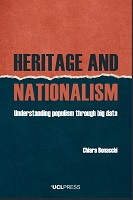Heritage and Nationalism
Understanding populism through big data
Abstract
How was the Roman Empire invoked in Brexit Britain and in Donald Trump’s United States of America, and to what purpose? And why is it critical to answer these kinds of questions? Heritage and Nationalism explores how people’s perceptions and experiences of the ancient past shape political identities in the digital age. It particularly examines the multiple ways in which politicians, parties and private citizens mobilise aspects of the Iron Age, Roman and Medieval past of Britain and Europe to include or exclude ‘others’ based on culture, religion, class, race, ethnicity, etc. Chiara Bonacchi draws on the results of an extensive programme of research involving both data-intensive and qualitative methods to investigate how pre-modern periods are leveraged to support or oppose populist nationalist arguments as part of social media discussions concerning Brexit, the Italian Election of 2018 and the US-Mexican border debate in the US. Analysing 60 million tweets and Facebook posts, comments and replies, this book is the first to use big data to answer questions about public engagement with the past and identity politics. The findings and insightful conclusions revise and reframe the meaning of populist nationalism today and help to build a shared basis for the democratic engagement of citizens in public life in the future. The book offers a fascinating and unmissable read for anyone interested in how the past and its contemporary legacy, or ‘heritage’, influence our ‘political’ thinking and feeling in a time of hyper-interconnectivity.
Keywords
nationalism; populism; big data; archaeology; history; social media; museum and heritage studies; museum studies; anthropology; archeology; political scienceDOI
10.14324/111.9781787358010ISBN
9781787358010, 9781787358027, 9781787358034, 9781787358041, 9781787358058, 9781787358010Publisher
UCL PressPublisher website
https://www.uclpress.co.uk/Publication date and place
London, 2022Imprint
UCL PressClassification
Museology and heritage studies
Archaeology
Anthropology
Political science and theory


 Download
Download